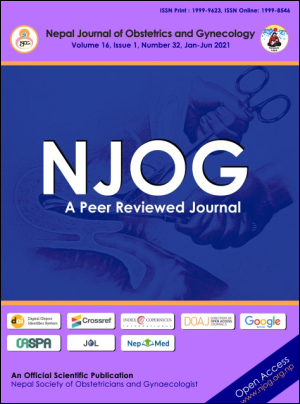Anti-mullerian hormone as an emerging promising marker in the prognosis of PCOS
Keywords:
anti-mullerian hormone, hyperandrogenism, oligomenorrhoea, polycystic ovarian syndrome, rotterdam criteriaAbstract
Aims: To correlation of AMH with clinical, hormonal and ultrasound findings; and determine the role of AMH as prognostic marker.
Methods: This was a prospective cross sectional study on women attending Gynaecology outpatient department of Medial College and Hospital, Kolkata, from January 2018 to June 2019. Study comprised of 70 newly diagnosed cases of PCOS using Rotterdam criteria 2003. Clinical history included menstrual complaint, hirsutism and weight gain; examination included BMI and Ferriman-Gallwey score; and investigations included FBS, 2hr PPBS, TSH, Prolactin, total testosterone, LH, AMH level and pelvic USG before starting intervention and same parameters were rechecked after 3 months of treatment completion.
Results: A total of 70 PCOS patients were included in a study conducted within 1 year time period. The most common Phenotype in our study is Phenotype A (O+H+P) which was almost 85.71%, followed by Phenotype B (O+H) 7.14% and the least we got Phenotype C (H+P) that is 2.86%. There was statistically significant (p<0.05) decrease in AMH level following treatment of PCOS (before treatment mean AMH level was 9.634.42 and after treatment the level was 5.812.77).
Conclusions: The most frequent PCOS phenotype in Indian women is A (O+H+P). Therapy in PCOS women with raised AMH reduces the AMH levels. Measurement of serum AMH provides a high specificity and sensitivity by which it can act as a prognostic marker for PCOS.
Downloads
Downloads
Published
How to Cite
Issue
Section
License

This work is licensed under a Creative Commons Attribution-NonCommercial 4.0 International License.
Copyright on any research article in the Nepal Journal of Obstetrics and Gynaecology is retained by the author(s).
The authors grant the Nepal Journal of Obstetrics and Gynaecology a license to publish the article and identify itself as the original publisher.
Articles in the Nepal Journal of Obstetrics and Gynaecology are Open Access articles published under the Creative Commons CC BY-NC License (https://creativecommons.org/licenses/by-nc/4.0/)
This license permits use, distribution and reproduction in any medium, provided the original work is properly cited, and it is not used for commercial purposes.



